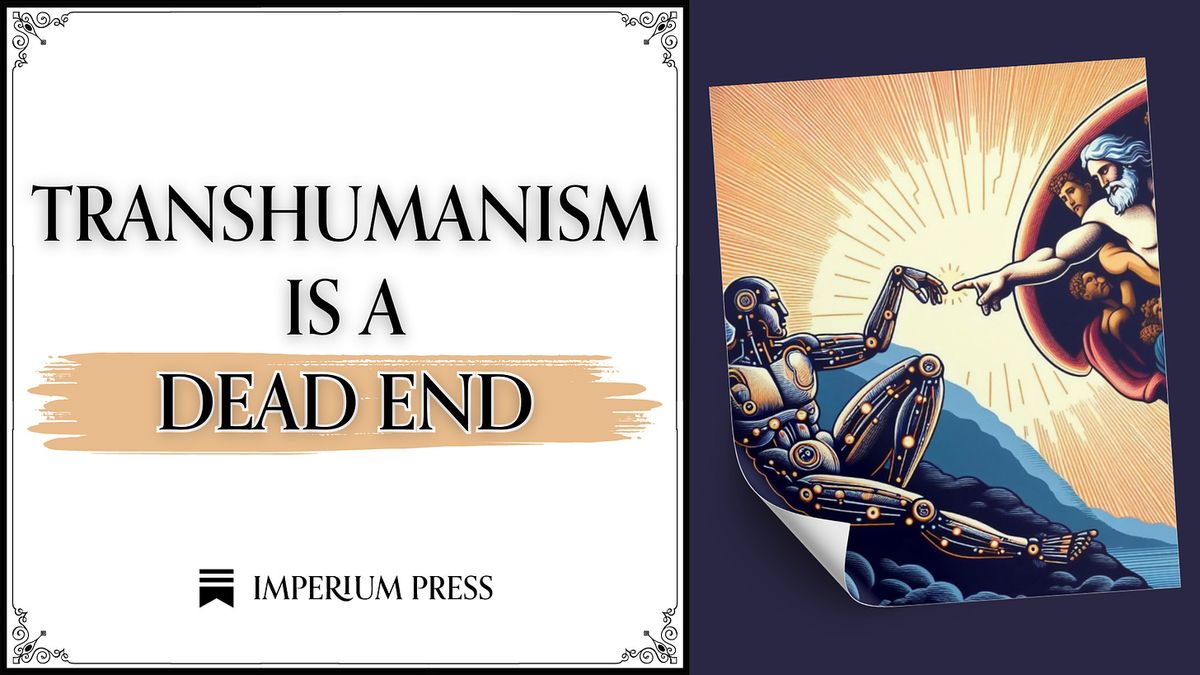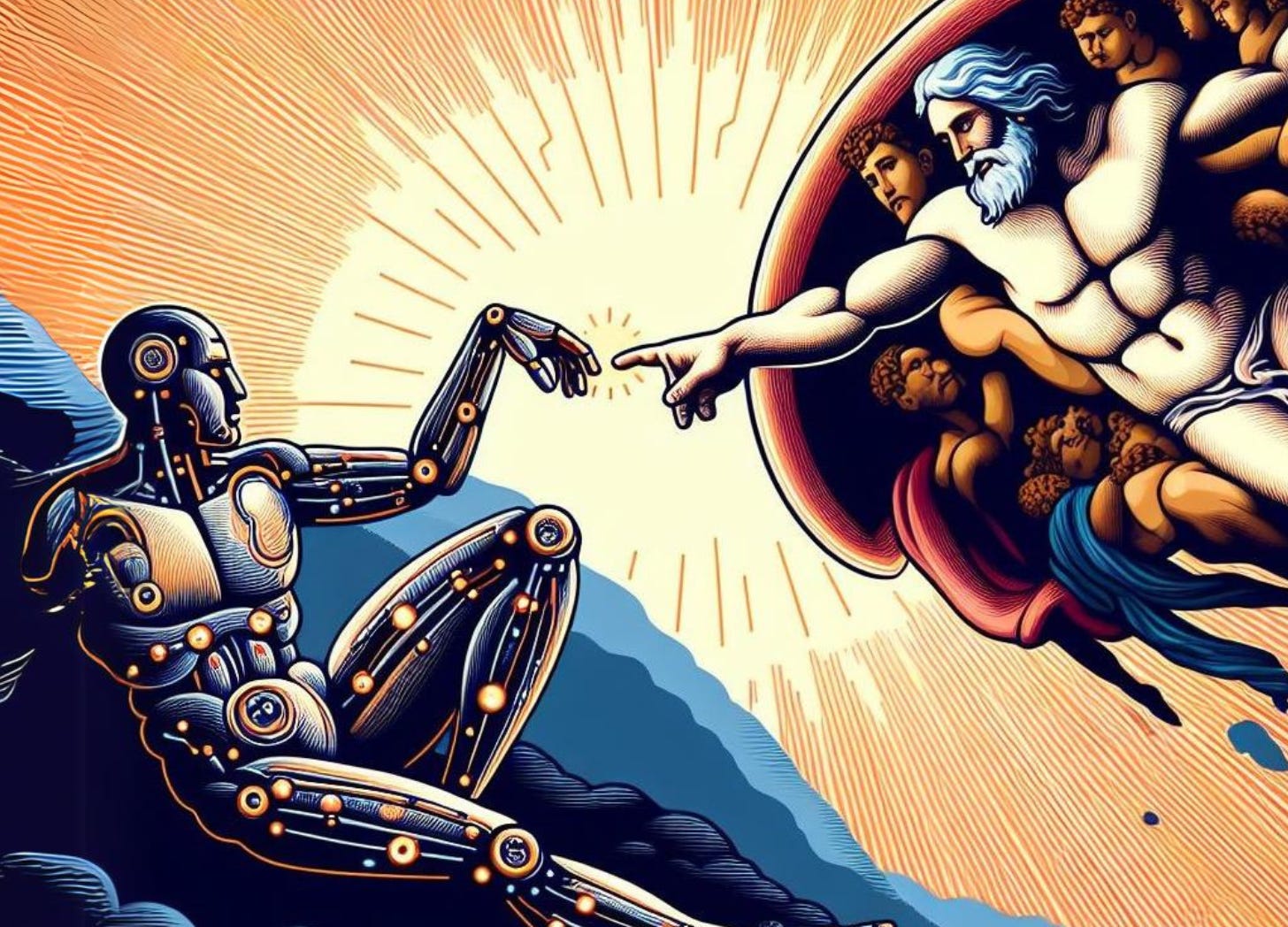Transhumanism is a Dead End

Europeans Are Not Faustian
If you prefer the audio of this article, click here.
In my article on the alt-centre I spent some time rebutting Anatoly Karlin as a purveyor of the idea that liberals are the cognitive elite. For lack of space I simply dismissed his transhumanism as unserious Dunning-Krugerism, which almost everyone in our readership agrees with. The illiberal right is possessed of the healthiest and most adaptive worldview available today, so it quite naturally rejects transhumanism. And yet, the illiberal right has also swallowed the meme that we are Faustian in our very bones. The embrace of Faustianism and the rejection of transhumanism is evidence of a deep conflict in our worldview—the one is the logical consequence of the other.
“The Faustian” as a civilizational ethos comes from Oswald Spengler, a beloved figure among illiberals. And to be sure, Spengler has a lot to offer, but his outlook was also flawed in some important ways.1 His Decline of the West gets a lot of things right that no one before him had gotten right, but it errs in considering “Faustian” (essentially, Germanic) civilization as too distinct from Classical civilization, which leads him to do things like gerrymander the Italian renaissance into ackshually being a Germanic thing, and handwave away the clearly “classical” rootedness of the French and German peasant as irrelevant.
At the broadest level, Spengler errs in downplaying the continuity and resemblance between Faustian and Classical civilization. What he has discovered is, in essence, two aspects of one folk-group—the Odinic vs. the Tyrrhic. Spengler calls Northwestern Europeans Faustian, a restless impulse which we will define presently. The foil to it we could call the Odyssean, that which is always seeking return, rootedness, familiarity.
According to Spengler, Faustian civilization’s ur-idea is expansion into the infinite. Northwest Europeans’ spiritual essence is, supposedly, striking into unknown spaces—physical and conceptual—and this explains our colonial drive. We are, of course, hardly the only colonial people—one might think of the Mongols or Arabs for example. And our own colonialism is probably a low impulse. Colonization is not something done by elites (which, recall, Spengler wants to focus on at the expense of the folk), but by sub-elite and what we could anachronistically call bourgeois elements of society: younger family branches, mercantile types, and oppressed minorities. Think minor Norman nobility, Columbus, the Puritans. The impulse to leave the land of your fathers is rarely for adventure, but rather because the social mobility ladder has been kicked out from under you.
But Faustianism is not just adventure, it is the obsession with transcending boundaries, for no purpose other than transcending boundaries. It is something grotesque and defective. It is not the spirit of the West. In fact, the “trans” prefix is very telling. Faustian man seeks ultimately to transcend his own nature and legislate what he is, against all nature, like Cnut commanding the tide to retreat. “Cis” is Odyssean; “trans” is Faustian. Nothing good can come of this.
Faustianism is really a low-resolution version of what we have called the Odinic. The Odinic is the spirit of restlessness and overcoming, but the difference is that the Odinic is always locked into a dialectic with the Tyrrhic, what is earthbound and traditional. The Odinic is sovereign, but part of a whole. The Faustian is the deformed attempt of the part to break away from the whole. It throws off the Odyssean and strides into very dark territory. The natural conclusion of transcending boundaries is transcending our biology. The most Faustian people alive are Yuval Noah Harari and Bruce Jenner. Are these our models?
It might be reasonably asked whether transhumanism isn’t inevitable, whether all this protest against Faustianism isn’t just academic. In other words, isn’t transhumanism just progress? One could imagine how the use of CRISPR technology might confer an advantage the way any technology might. After all, why should we not try to improve ourselves?
The argument is plausible on its face, but it fails for the same reason that all eugenics fails—humans are terrible judges of “improvement” or fitness.
If you’d had eugenicists in the Bronze Age they would have favoured autistic chads; in the Middle Ages the favoured type was the uncreative walking textbook; in the Romantic era it was a Goethe on every street corner but who couldn’t grow a potato to save his life. Imagine if these had all got their heart’s desire?2
And we are almost certainly dumber today than we were in the Romantic era. In fact, if our best science is true, we’re dumber than we have been in 400 years,3 maybe much longer than that. So we are probably not up to the task of perfecting and implementing this technology on a broad scale.
But even if all our trans dreams do come true and we start gene-editing ourselves, the result would be success for a century or so, and then disaster. Invariably we will have forgotten to carry the one somewhere, or not have seen something obvious. It is unbelievably hubristic to think that we are better judges of fitness than nature. We think of ourselves as Faustian, or perhaps Promethean, but hubris is the essential lesson of the Prometheus myth. He gets his guts ripped out by an eagle for eternity for being Promethean. Even in the Faust folklore itself, Faust is condemned to hell. The Odyssean impulse goes as deep as the Faustian.

Because eugenicists are autists, eugenics tends to select for monocultures, and monocultures are fragile. In nature you never see the kind of biological monocultures that modernity has produced. Every human civilization and type are converging on the same domesticated, iterative, uncreative bug species. Nowhere else in nature do you see that kind of uniformity, because it is maladaptive at the group level. It supposes that conditions will never change. Not if, but when they do, the whole group dies off. Phenotypic diversity is the secret sauce of why white people have been able to conquer the world, not some vague impulse toward horizons.
Techno-acceleration is a bear market. Our collective IQ is in freefall, and no other people can manage it the way we can. And yet, if you were a white imperialist, you would be encouraging them. In fact, our white imperialist would positively be forcing it on them. Not only is the tech singularity impossible, even if it wasn’t, it would be the most disastrous idea ever. If you have a realist and historical view of technology, you understand that dependence upon it makes a people weaker and more fragile. And consider the stakes of literally editing the very thing that the technology depends on—your collective intelligence. In performing brain surgery on yourself, you would be lucky if you didn’t chop off your own hand.
But this is all an academic question anyway, because the tech singularity is not going to happen. Scientific advancement has been slowing since at least the 1950s and probably since the 30s if you count only the hard and not applied sciences. This is because technology has a dysgenic effect—it permits less fit humans to survive and reproduce. There is a natural ceiling on how much technical advancement a civilization can produce, because the system is a negative feedback loop pushing down the very intelligence required to sustain it. There will not be any singularity; it’s just a fever dream of Harari types who are useful for globalization.
Faustianism is a huge sacred cow among the illiberal right, because it makes us feel special. Sadly, a thorough understanding of history reveals it to be mostly a meme. We are special for many reasons, but that is not one of them. “We wanted to conquer new lands” is usually a just-so story told by a people to conceal their real origins, often from themselves. This is not to say that colonialism is bad—it’s necessary and good. But what it is not, is the essence of the West.
Imperium Press needs your support. Subscribing to this blog helps us keep the lights on. ↓↓↓Subscribe1
Without going into detail, one could think of his ideas of “spiritual race” and his overall pessimism.2
https://imperiumpress.substack.com/p/diversity-is-our-strength3
See Ed Dutton’s book Breeding the Human Herd.